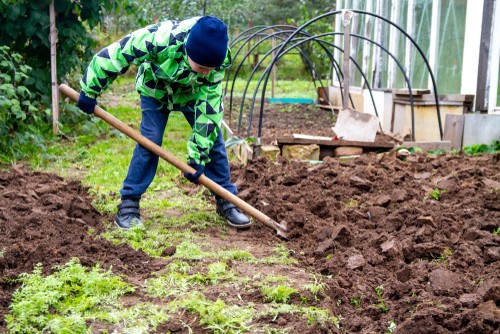If you’re new to gardening, then it might be understandable if you think your gardening duties end after the last harvest of the season. But the truth is, if you want to enjoy a bountiful garden next year, then you still have work to do. In this guide, you’ll learn how to prepare your garden for winter, so it can be ready to go when the spring thaw comes. Here are six fall gardening tips you’ll want to act on before the snow starts falling.
#1: Clear Away the Dead Plants
When you notice your plants starting to wilt, then it’s time to get them out of the ground. If the plants are not showing signs of disease, then they can be tossed in your compost pile. But if the plants are diseased, then you’ll want to keep them out of the compost pile because the disease will spread to next year’s plants. Throw the diseased plants in the trash or burn them.
#2: Remove Stakes and Plant Supports
If you used stakes and supports to prop up your plants, then take them out of the ground, clean them up, and store them away for winter. If you don’t remove them, then they can pose an injury risk should they be covered over by snow.
#3: Till the Soil
Give the soil a gentle till before the ground gets too hard. This not only helps aerate it, but it also helps expose any insects that might be planning to overwinter in your garden. If you battle Japanese beetles every year, then this is one of the best ways to reduce their population because grubs live and overwinter in garden soil.
#4: Add Nutrients to the Soil
After tilling the soil, add a layer of compost, aged manure, and leaves and circulate the material into the soil to help build up nutrients for next spring. If you need to add lime to your soil to raise its pH, then this is a great time to do that as well.
#5: Plant Cover Crops
If you don’t get a lot of snow in your area, then planting cover crops in the fall will help improve the quality of your soil. Some cover crops to consider include winter rye, red clover, hairy vetch, oats, and buckwheat. These and other cover crops can help attract beneficial insects and improve the nutrients in the soil.
#6: Cover Sections Overgrown With Weeds
If part of or all of your garden has gone to weeds, cover the overgrown areas with a layer of black plastic sheeting or cardboard and leave the covering in place for the entire winter season. This is an effective way to kill the existing weeds and subdue sprouting seeds.
Don’t Neglect Preparing Your Garden for Winter
Preparing your garden for winter doesn’t take a lot of time. In fact, it takes a lot less time to clean it up in the fall than it does if you choose to wait and get it in order in the spring. So, take a weekend while the weather is still nice, and get your garden cleaned up before the winter season starts. You’ll pat yourself on the back next spring for cutting your to-do list in half.


